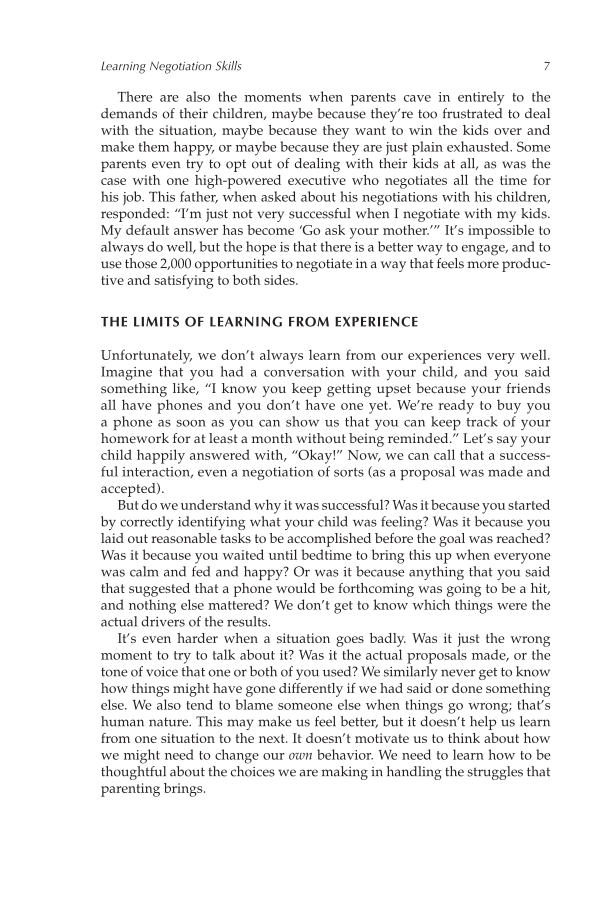Learning Negotiation Skills 7 There are also the moments when parents cave in entirely to the demands of their children, maybe because they’re too frustrated to deal with the situation, maybe because they want to win the kids over and make them happy, or maybe because they are just plain exhausted. Some parents even try to opt out of dealing with their kids at all, as was the case with one high-powered executive who negotiates all the time for his job. This father, when asked about his negotiations with his children, responded: “I’m just not very successful when I negotiate with my kids. My default answer has become ‘Go ask your mother.’” It’s impossible to always do well, but the hope is that there is a better way to engage, and to use those 2,000 opportunities to negotiate in a way that feels more produc- tive and satisfying to both sides. THE LIMITS OF LEARNING FROM EXPERIENCE Unfortunately, we don’t always learn from our experiences very well. Imagine that you had a conversation with your child, and you said something like, “I know you keep getting upset because your friends all have phones and you don’t have one yet. We’re ready to buy you a phone as soon as you can show us that you can keep track of your homework for at least a month without being reminded.” Let’s say your child happily answered with, “Okay!” Now, we can call that a success- ful interaction, even a negotiation of sorts (as a proposal was made and accepted). But do we understand why it was successful? Was it because you started by correctly identifying what your child was feeling? Was it because you laid out reasonable tasks to be accomplished before the goal was reached? Was it because you waited until bedtime to bring this up when everyone was calm and fed and happy? Or was it because anything that you said that suggested that a phone would be forthcoming was going to be a hit, and nothing else mattered? We don’t get to know which things were the actual drivers of the results. It’s even harder when a situation goes badly. Was it just the wrong moment to try to talk about it? Was it the actual proposals made, or the tone of voice that one or both of you used? We similarly never get to know how things might have gone differently if we had said or done something else. We also tend to blame someone else when things go wrong that’s human nature. This may make us feel better, but it doesn’t help us learn from one situation to the next. It doesn’t motivate us to think about how we might need to change our own behavior. We need to learn how to be thoughtful about the choices we are making in handling the struggles that parenting brings.
Document Details My Account Print multiple pages
Print
You have printed 0 times in the last 24 hours.
Your print count will reset on at .
You may print 0 more time(s) before then.
You may print a maximum of 0 pages at a time.


































































































































































































